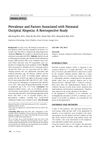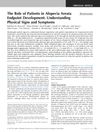Search
for
Sort by
Research
30 / 1000+ results
research The ET Interview: Herman Bierens
Herman Bierens had a successful career in econometrics, contributed to education, and plans to continue research after retirement.

research Mayo Clinic Office Visit: Female-Pattern Hair Loss Interview with Rochelle Torgerson, M.D., Ph.D.
Dr. Rochelle Torgerson says female-pattern hair loss is often hereditary, starts after puberty, and can be slowed with treatments like Minoxidil. It can also indicate other health issues.

research Hair Sciences: An Interview with Dr. Rodney Sinclair on Female Pattern Hair Loss
Dr. Rodney Sinclair uses a detailed grading system to diagnose female pattern hair loss, recommends daily spironolactone and minoxidil for treatment, and believes genetics play a role in the condition.

research Pioneers in Dermatology and Venereology: An Interview with Professor Francisco Miguel Camacho Martinez
Francisco Camacho Martinez has made significant contributions to skin and sexually transmitted diseases, developed surgical techniques, but is concerned about patient survival rates and over-specialization in dermatology.

research ‘You Lose Your Hair, What’s the Big Deal?’ I Was So Embarrassed, I Was So Self-Conscious, I Was So Depressed: A Qualitative Interview Study to Understand the Psychosocial Burden of Alopecia Areata
Alopecia Areata (AA) causes significant emotional distress, including feelings of embarrassment, depression, and anxiety, and impacts social interactions and daily activities.
research A Case of Trichotillomania Presenting as a Factitious Ulcer
Thorough patient interviews are crucial to identify self-inflicted hair loss.

research Body Dysmorphic Concerns, Social Adaptation, and Motivation for Psychotherapeutic Support in Dermatological Outpatients
Some skin patients have body image issues linked to social difficulties but want psychological help.

research Psychological Interventions for the Quality of Life of Women With Polycystic Ovary Syndrome: A Scoping Review of Clinical Trials
Psychological interventions can improve the quality of life for women with PCOS.
research Understanding Key Symptoms, Side Effects, and Impacts of HR+/HER2- Advanced Breast Cancer: Qualitative Study Findings
Patients with HR+/HER2- advanced breast cancer commonly experience fatigue, hair loss, and pain, which significantly affect daily activities.
research Dermatological Changes During Menopause and HRT: What to Expect
Menopause worsens skin, hair, and nails, affecting self-esteem and quality of life.

research Patient Recovery from COVID-19 Infections: Follow-Up of Hair, Nail, and Skin Manifestations
Some recovered COVID-19 patients experience skin, hair, and nail issues, suggesting they need follow-up care.

research Visualizing Clinic Routines from Multiple Points of View
Different staff in a dermatology clinic understand mostly their own tasks, not the full clinic process.
research The Role of Cognitions and Beliefs in Trichotillomania: A Qualitative Study Using Interpretative Phenomenological Analysis
Cognitions significantly influence Trichotillomania, suggesting cognitive therapies could help.
research Prematurity: Is It a Risk Factor for Striae Distensae?
Premature birth increases the risk of striae distensae.

research Anifrolumab Treatment Improves Quality of Life and Decreases Corticosteroid Use in Patients with Systemic Lupus Erythematosus
Anifrolumab improves quality of life and reduces steroid use in SLE patients.

research Prevalence and Factors Associated with Neonatal Occipital Alopecia: A Retrospective Study
The study concluded that neonatal occipital alopecia is common, not caused by physical friction, and usually resolves on its own without treatment.

research The Role of Patients in Alopecia Areata Endpoint Development: Understanding Physical Signs and Symptoms
The main goal for new Alopecia Areata treatments should be significant improvement in scalp hair growth.

research A Retrospective Study on the Characteristics of Androgenetic Alopecia Among Asian Races in the National Skin Centre, a Tertiary Dermatological Referral Centre in Singapore
Most patients with hair loss sought treatment for cosmetic reasons, were unhappy about their appearance, and had a family history of the condition, suggesting it may be inherited.

research Significance of Psychosomatic Factors in the Etiopathogenesis of Alopecia Areata
Psychological factors play a significant role in developing alopecia areata.

research Anifrolumab Treatment Improves Quality of Life and Decreases Systemic Corticosteroid Use in Patients with Systemic Lupus Erythematosus
Anifrolumab improves quality of life and reduces steroid use in lupus patients.

research Topical Minoxidil in the Treatment of Male Erectile Dysfunction
Topical minoxidil not effective for erectile dysfunction treatment.

research Health-Related Quality of Life Questionnaire for Polycystic Ovary Syndrome (PCOSQ-50): Development and Psychometric Properties
The PCOSQ-50 is a valid and reliable questionnaire for measuring quality of life in Iranian women with PCOS.

research Can You Pull It Off? Appearance Modifying Behaviors Adopted by Wig Users with Alopecia in Social Interactions
Wig users with alopecia do a lot of emotional and practical work to make their wigs look natural and manage how others see them.

research Intermittent and Persistent Type 2 Lupus: Patient Perspectives on Two Distinct Patterns of Type 2 SLE Symptoms
SLE patients experience two patterns of non-inflammatory symptoms: intermittent and persistent.

research The Feminism and Psychology Undergraduate Prize 1999: Prizewinning Entry
The entry showed that PCOS negatively affects women's self-image and is worsened by societal expectations, suggesting a need for more feminist attention to the condition.

research Development of the Alopecia Areata Patient Priority Outcomes Instrument: A Qualitative Study
Researchers created a new tool to measure the effects of alopecia areata from the patient's view, focusing on hair loss, daily life, and emotional health.
research Patient Experience in Systemic Lupus Erythematosus: Development of Novel Patient-Reported Symptom and Patient-Reported Impact Measures
New tools were created to help lupus patients report their symptoms and impacts more accurately.

research Cutaneous Lupus Concerns from the Patient Perspective: A Qualitative Study
Patients with cutaneous lupus are most concerned about self-consciousness, physical symptoms, and disease progression.

research Dermatologist and Patient Perceptions of Treatment Success in Alopecia Areata and Evaluation of Clinical Outcome Assessments in Japan
Both dermatologists and patients in Japan agree that treatment success for alopecia areata is having 20% or less scalp hair loss.